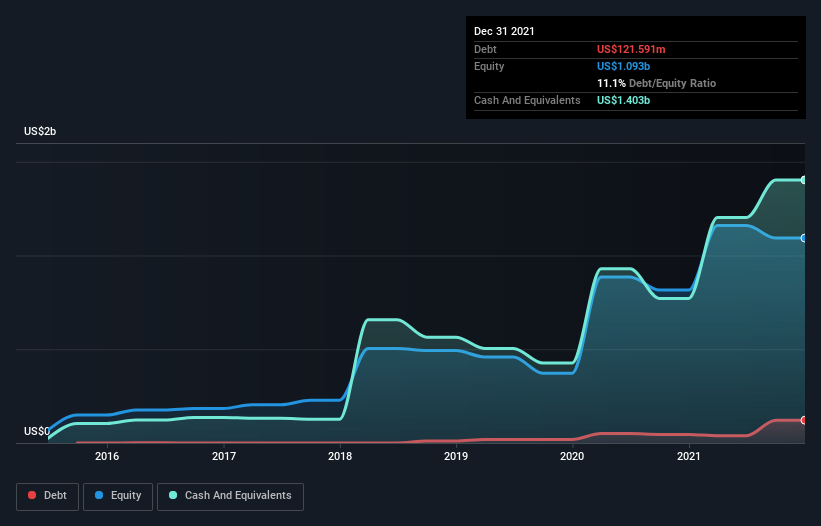- Hong Kong
- /
- Life Sciences
- /
- SEHK:1548
Health Check: How Prudently Does Genscript Biotech (HKG:1548) Use Debt?
Warren Buffett famously said, 'Volatility is far from synonymous with risk.' When we think about how risky a company is, we always like to look at its use of debt, since debt overload can lead to ruin. As with many other companies Genscript Biotech Corporation (HKG:1548) makes use of debt. But should shareholders be worried about its use of debt?
Why Does Debt Bring Risk?
Debt is a tool to help businesses grow, but if a business is incapable of paying off its lenders, then it exists at their mercy. If things get really bad, the lenders can take control of the business. However, a more common (but still painful) scenario is that it has to raise new equity capital at a low price, thus permanently diluting shareholders. Of course, plenty of companies use debt to fund growth, without any negative consequences. The first thing to do when considering how much debt a business uses is to look at its cash and debt together.
View our latest analysis for Genscript Biotech
How Much Debt Does Genscript Biotech Carry?
As you can see below, at the end of December 2021, Genscript Biotech had US$121.6m of debt, up from US$45.9m a year ago. Click the image for more detail. But on the other hand it also has US$1.40b in cash, leading to a US$1.28b net cash position.

A Look At Genscript Biotech's Liabilities
Zooming in on the latest balance sheet data, we can see that Genscript Biotech had liabilities of US$464.4m due within 12 months and liabilities of US$675.4m due beyond that. Offsetting these obligations, it had cash of US$1.40b as well as receivables valued at US$144.0m due within 12 months. So it can boast US$407.4m more liquid assets than total liabilities.
This surplus suggests that Genscript Biotech has a conservative balance sheet, and could probably eliminate its debt without much difficulty. Simply put, the fact that Genscript Biotech has more cash than debt is arguably a good indication that it can manage its debt safely. When analysing debt levels, the balance sheet is the obvious place to start. But ultimately the future profitability of the business will decide if Genscript Biotech can strengthen its balance sheet over time. So if you're focused on the future you can check out this free report showing analyst profit forecasts.
In the last year Genscript Biotech wasn't profitable at an EBIT level, but managed to grow its revenue by 31%, to US$511m. Shareholders probably have their fingers crossed that it can grow its way to profits.
So How Risky Is Genscript Biotech?
By their very nature companies that are losing money are more risky than those with a long history of profitability. And the fact is that over the last twelve months Genscript Biotech lost money at the earnings before interest and tax (EBIT) line. Indeed, in that time it burnt through US$274m of cash and made a loss of US$348m. Given it only has net cash of US$1.28b, the company may need to raise more capital if it doesn't reach break-even soon. Genscript Biotech's revenue growth shone bright over the last year, so it may well be in a position to turn a profit in due course. By investing before those profits, shareholders take on more risk in the hope of bigger rewards. The balance sheet is clearly the area to focus on when you are analysing debt. However, not all investment risk resides within the balance sheet - far from it. For example - Genscript Biotech has 2 warning signs we think you should be aware of.
If you're interested in investing in businesses that can grow profits without the burden of debt, then check out this free list of growing businesses that have net cash on the balance sheet.
New: Manage All Your Stock Portfolios in One Place
We've created the ultimate portfolio companion for stock investors, and it's free.
• Connect an unlimited number of Portfolios and see your total in one currency
• Be alerted to new Warning Signs or Risks via email or mobile
• Track the Fair Value of your stocks
Have feedback on this article? Concerned about the content? Get in touch with us directly. Alternatively, email editorial-team (at) simplywallst.com.
This article by Simply Wall St is general in nature. We provide commentary based on historical data and analyst forecasts only using an unbiased methodology and our articles are not intended to be financial advice. It does not constitute a recommendation to buy or sell any stock, and does not take account of your objectives, or your financial situation. We aim to bring you long-term focused analysis driven by fundamental data. Note that our analysis may not factor in the latest price-sensitive company announcements or qualitative material. Simply Wall St has no position in any stocks mentioned.
About SEHK:1548
Genscript Biotech
An investment holding company, engages in the manufacture and sale of life science research products and services in the United States of America, Europe, Mainland China, Europe, Asia Pacific, and internationally.
Excellent balance sheet and good value.
Similar Companies
Market Insights
Community Narratives


Recently Updated Narratives


Fiducian: Compliance Clouds or Value Opportunity?


Q3 Outlook modestly optimistic


Alphabet: The Under-appreciated Compounder Hiding in Plain Sight
Popular Narratives


The company that turned a verb into a global necessity and basically runs the modern internet, digital ads, smartphones, maps, and AI.


MicroVision will explode future revenue by 380.37% with a vision towards success



